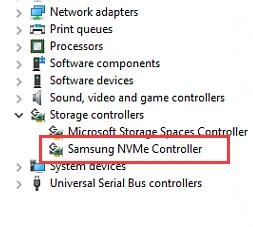

View this thread in our forums! Article Contents

Let’s have a look at the performance! Questions or comments? The sequential performance numbers are close to the drives rated speeds, but the Random read operations was half of the 300,000 IOPS that the drive is rated for. We ran the quick test and it showed the SM951 NVMe 256GB SSD had sequential read/write performance of 2247/1440 MB/s and a Random Read/Write of 173,276/110,410 IOPS. The only advanced thing that we could do on the Samsung SM951 NVMe drive was to run the built-in disk drive performance test in Samsung Magician! It did show the firmware version that we are running at the time of testing and it was BXW7. We downloaded the latest version of Samsung Magician and the drive was detected, but none of the SMART data was visible. The Samsung SM951 NVMe 256GB M.2 PCIe SSD did not show up on CrystalDiskInfo 6.3.2, so we went utility hunting for something that could read the drive. Intel X99 Test Bench Intel LGA 2011v3 Test Platform We left the Samsung SM951 NVMe drive properties alone, so write caching was left enabled by default. Samsung does not have an NVMe controller driver, so we used the native driver that comes with Windows 8.1. The SSD was activated in disk management with a drive letter and we performed a quick format with all the default settings. We inserted that adapter into the secondary PCI Express Gen 3.0 x16 slot. We tested with the Samsung SM951 NVMe M.2 PCIe SSD in the ASUS Hyper M.2 x4 HHHL adapter.
#Samsung nvm express driver 3.0 64 bit drivers
The Intel SSD 750 Series used Intel NVMe drivers and the Samsung SM951 NVMe drive used the Microsoft NVMe drivers that come in Windows 8.1 We used Intel RST storage drivers for the AHCI drives, the exact version was 13. The Corsair Neutron XT 240GB SSD was used as the primary drive. The Crucial Ballistix DDR4 32GB 2400MHz memory kit was run at 2666MHz with 15-15-15-28 1T memory timings. The Intel X99 platform that we used to test the M.2 PCIe SSD was based around the ASUSX99 Sabertooth motherboard with BIOS 1702 that came out on. We also disabled Turbo mode on the Intel Core i7-5960X to ensure our numbers are spot on and repeatable. Windows 8.1 also had the power option set to high performance. This means windows defender, windows update, disk fragmentation and everything else that would interfere with testing was disabled.
#Samsung nvm express driver 3.0 64 bit install
All testing was done on a fresh install of Windows 8.1 Pro 64-bit and benchmarks were completed on the desktop with no other software programs running. Samsung SM951 NVMe M.2 PCIe SSD Test Systemīefore we look at the numbers, lets take a brief look at the test system that was used.


 0 kommentar(er)
0 kommentar(er)
